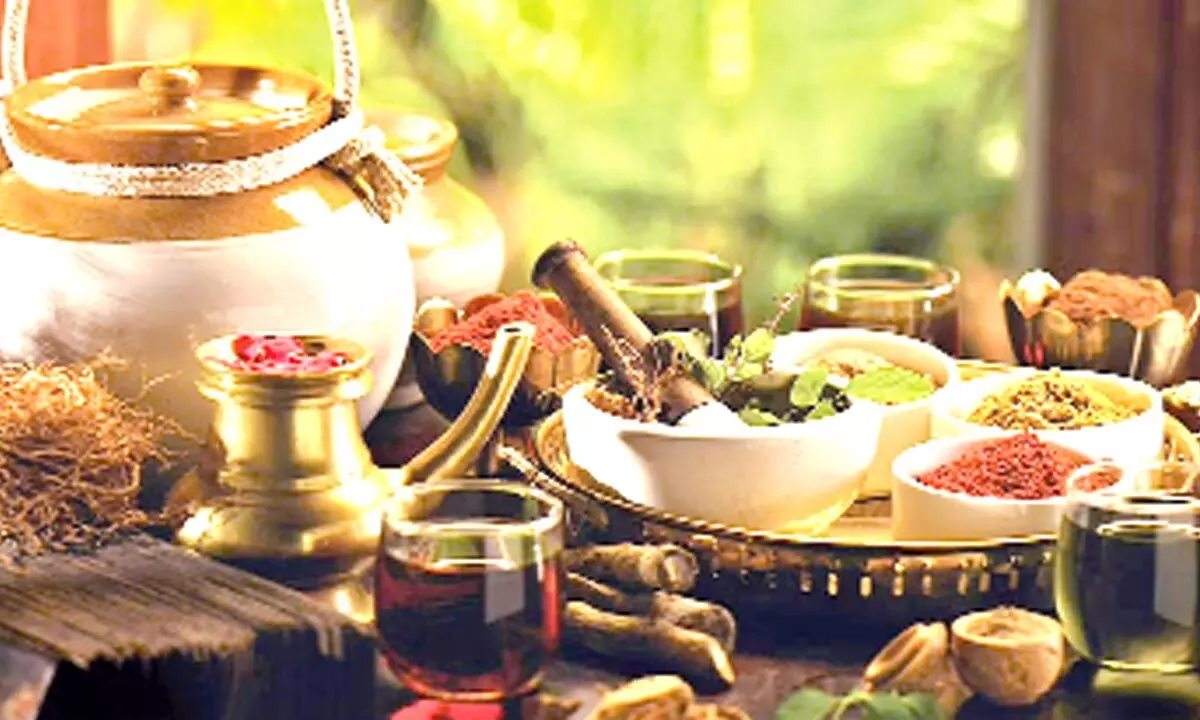Further steps needed to boost Ayush & herbal products exports
Exports of Ayush and herbal products in FY18 was 8.91 cr kg, which has grown to 12.61 cr kg during FY22, a year when globally industries faced supply chain constraints
image for illustrative purpose

Exports for the first two months of the current fiscal year of 2022-23 was at 2.15 crore kilogram, while imports crossed 1.07 crore kilogram during the two months of April and May, this year. Imports have registered a steady growth till 2020-21, when it touched 7.63 crore kilogram, though the following year of 2021-22 has seen a decline
During the last five years till the fiscal year 2021-22, exports of Ayurveda, Unani, Siddha and Homoeopathy (Ayush) and herbal products have registered only 41.5 per cent growth in terms of volume. According to data from the Directorate General of Commercial Intelligence and Statistics (DGCIS), part of the Union Commerce Ministry, exports of Ayush and herbal products in the year 2017-18 was 8.91 crore kilograms, which has grown to 12.61 crore kilograms during the year 2021-22, a year when globally industries faced supply chain constraints.
Exports crossed 10 crore kilogram for the first time in the last five years in the year 2018-19, at 10.81 crore kilograms before falling to 9.22 crore kilograms in the following year. However, exports bounced back to 12.06 crore kilogram in the following year. Exports for the first two months of the current fiscal year of 2022-23 was at 2.15 crore kilogram, while imports crossed 1.07 crore kilogram during the two months of April and May, this year. Imports have registered a steady growth till 2020-21, when it touched 7.63 crore kilogram, though the following year of 2021-22 has seen a decline.
It is a fact that the Union Ministry of Ayush is taking various initiatives, including support to meet the international regulatory requirements, for the growth of exports of Ayush and herbal products from the country. In context to international regulatory requirements, the Ministry of Ayush has taken the steps including encouraging the Certification of Pharmaceutical Products (CoPP) as per World Health Organisation (WHO) guidelines for herbal products. The Ministry, in cooperation with the Quality Council of India (QCI) has developed a Quality Certification programme that is Premium mark to increase reliability of standards of ASU&H Products. Besides, in order to ensure Quality Standards of Ayush products, the Ministry has collaborated with the Bureau of Indian Standards to develop the International (ISO) Standards.
A Memorandum of Understanding (MoU) between the Pharmacopoeia Commission for Indian Medicine & Homoeopathy (PCIM&H), Ministry of Ayush and American Herbal Pharmacopoeia, USA was signed on September 13, 2021 for strengthening, promotion, and development of standards in the field of Ayurveda and other Indian traditional systems of medicine between the two countries on the basis of equality and mutual benefit. Besides, the Ministry has also established an India-EU Technical Working Group (TWG) on Ayurveda. The Technical Working Group has the representation of technical experts from the Ministry of Ayush, Government of India, the European Commission, the European Medicines Agency (EMA) and its Committee on Herbal Medicinal Products (HMPC).
As a part of the policy for the development and export of Ayush products and services across the world, the Ministry of Ayush has taken various steps including signing 25 Country to Country MoUs for cooperation in the field of Traditional Medicine and Homoeopathy with foreign nations. Another 37 MoUs have been signed with international institutes for undertaking collaborative research and academic collaboration. Besides, 15 MoUs have been signed with international institutes for the setting up of Ayush Academic Chairs in foreign nations. The Ministry has also provided support for the establishment of 38 Ayush Information Cells in 34 foreign nations. The Ministry, under its International Fellowship/Scholarship Programme, offers scholarships to foreign nationals for undertaking Ayush courses in recognized Ayush institutions in India.
More importantly, on April 20, 2022, the Central government has launched the Ayush Export Promotion Council (AEPC) which is aimed to oversee exports of products of Ayurveda, Homoeopathic, Siddha, Sowa Rigpa and Unani systems and address trade issues pertaining to these alternative medicine sectors. The Council was set up by the Union Ministry of Ayush in cooperation with the Union Ministry of Commerce and Industry, along with other stakeholders such as the Federation of Indian Chambers of Commerce and Industry (FICCI) and Invest India. The Council will have an exclusive focus on the implementation of trade-related initiatives and easing of trade issues while representing the interest of the Ayush exporters in all interactions with domestic and global stakeholders.
The Council will monitor exports of Ayush drugs and even services of the Ayush systems. The AEPC, which will have an exclusive focus on the implementation of trade-related initiatives and easing of trade issues in the Ayush sector, is being set up on the lines of Pharmaceuticals Export Promotion Council of India (Pharmexcil), which played a key role in promoting exports of pharmaceutical products. Of course, the government has done its bit, but there is need to give further fillip for growth of exports of Ayush and herbal products.
(The author is freelance journalist with varied experience in different fields)

